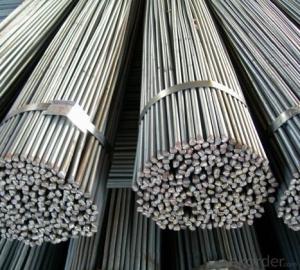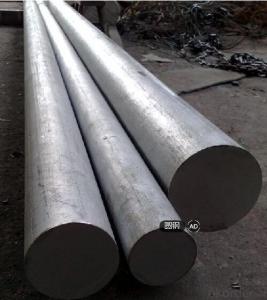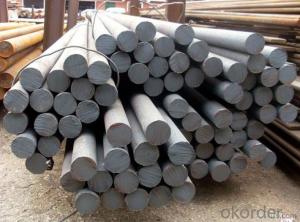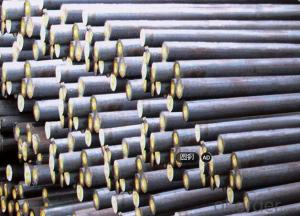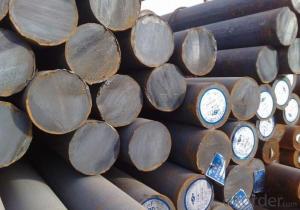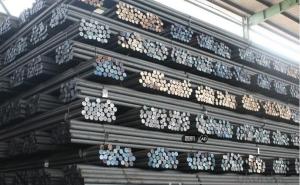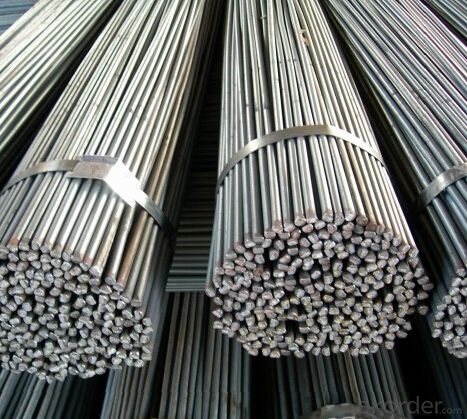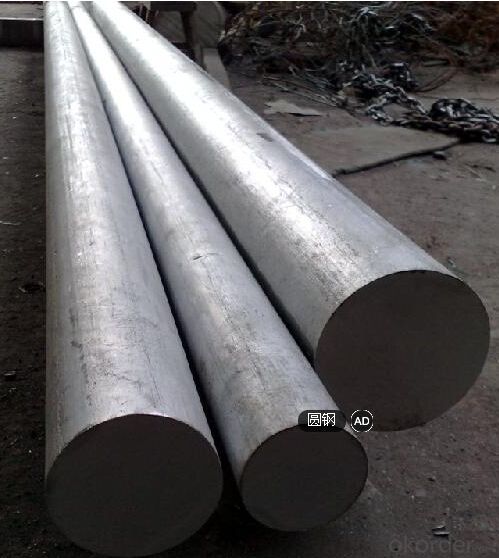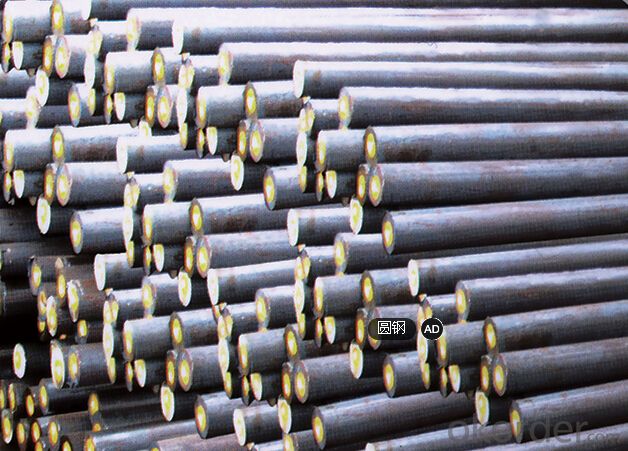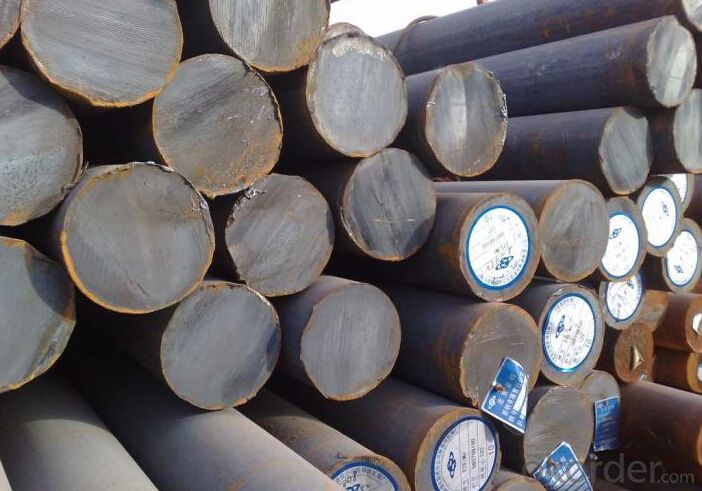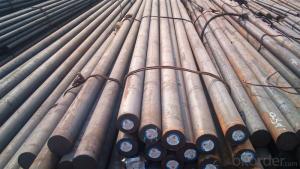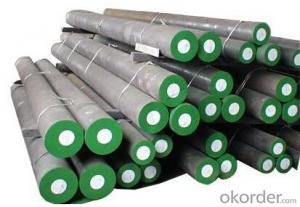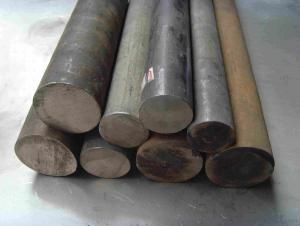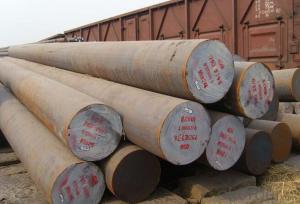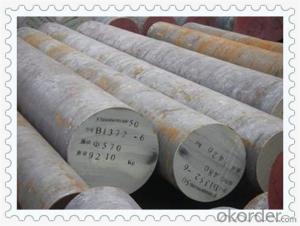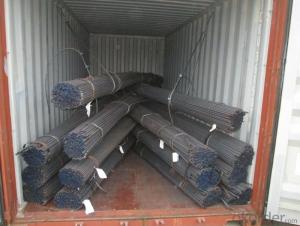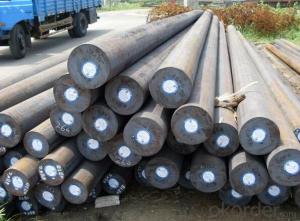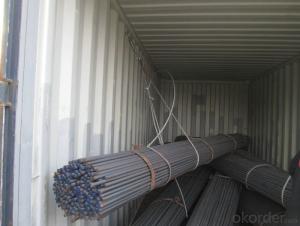Hot Work Die Steel Round Bar Grade H13 with Competitive Price
- Loading Port:
- Shanghai
- Payment Terms:
- TT OR LC
- Min Order Qty:
- 3 m.t.
- Supply Capability:
- 100000 m.t./month
OKorder Service Pledge
OKorder Financial Service
You Might Also Like
Specification
Hot Work Die Steel Round Bar Grade H13 with Competitive Price
Details Information of Hot Work Die Steel Round Bar Grade H13 with Competitive Price
| Name | Hot Work Die Steel Round Bar Grade H13 with Competitive Price |
| Shape | Round Bar/Square Bar/Flat Bar/Plate/Wire |
| Standard | GB/ASTM/SAE/AISI/DIN/JIS/EN/BS |
| Surface Treatment: | Black/Peeling/Polished/Machined |
| Delivery Condition: | Hot Rolled or Forged/Peeled or Black Surface |
| Test | SGS/UT 100% Elements Testing |
| Certificate: | ISO/Mill Certificate |
| Service: | 24 hours online service / |
| more than 20 years trading and manufacture | |
| Quality Assurance: | the third party inspection, such as SGS, BV, TUV…etc. is acceptable |
| Packaging Details: | Seaworthy Packaging or as per customer's packing instruction |
| Carbon structure round bar | Q195 Q235A Q235B 10# 20#-55# S45CB |
| Low alloy high strength round bar | Q345A/Q345C/Q345D Q345B Q345E |
| Alloy structure round bar | SAE51B20 20Cr 40Cr 40CrV 20CrMo/30CrMo/35CrMo/42CrMo 20CrMoA/30CrMoA/35CrMoA/42CrMoA/42Cr ML20CrMo/ML30CrMo/ML35CrMo/ML42CrMo B7/SCM435-440 20MnTiB 20CrMnMo 20CrMoH 42CrMoH 40MnB/40MnBH 30Mn2-40Mn2 27SiMn 50CrVA 30CrMnTi |
| Pinion steel | 20CrMnTi 20CrMnTiH 20CrMnTiHCS/20CrMnTiHLD Q20CrMnTi-1/Q20CrMnTi-2 |
| Sucker rod | 20-35CrMoA |
| Free-cutting steel | GT1215S |
| Spring steel | 60Si2MnA 65Mn |
| Ball bearing steel | GCr15 |
Chemical Composition of Hot Work Die Steel Round Bar Grade H13 with Competitive Price
| C | Si | Mn | P | S | Cr | Ni | Cu |
| 0.17-0.24 | 0.17-0.37 | 0.35-0.65 | ≤0.035 | ≤0.035 | ≤0.25 | ≤0.25 | ≤0.25 |
| Tensile strength (σb/MPa) | Yield strength (σb/MPa) | Elongation (δ5/%) |
| ≥410(42) | ≥245(25) | ≥25 |
Company Introduction of Hot Work Die Steel Round Bar Grade H13 with Competitive Price
CNBM International Corporation is the most import and export platform of CNBM group(China National Building Material Group Corporation) ,which is a state-owned enterprise, ranked in 270th of Fortune Global 500 in 2015.
With its advantages, CNBM International are mainly concentrate on Cement, Glass, Iron and Steel, Ceramics industries and devotes herself for supplying high quality series of refractories as well as technical consultancies and logistics solution.
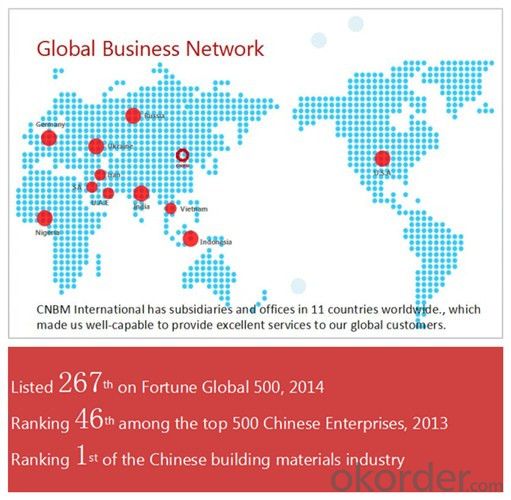
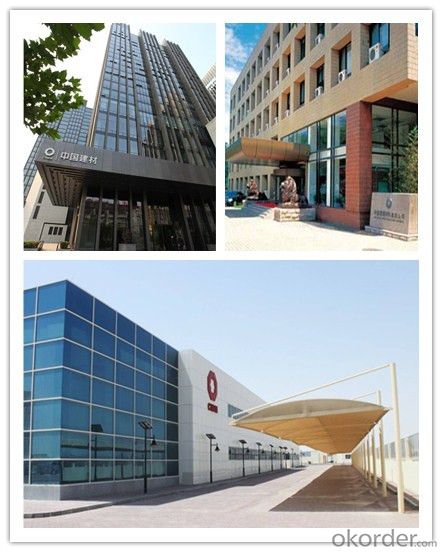
Certificates of Hot Work Die Steel Round Bar Grade H13 with Competitive Price
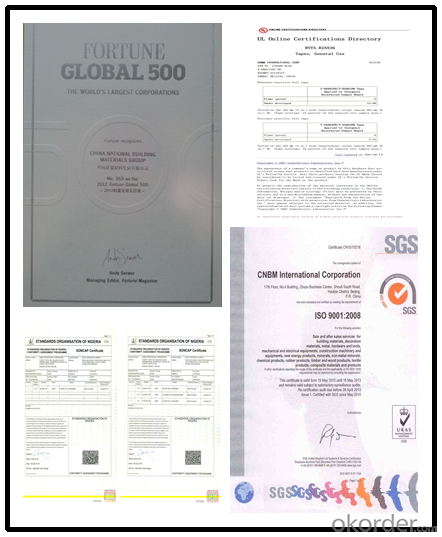
Packaging & Delivery of Hot Work Die Steel Round Bar Grade H13 with Competitive Price
Packaging Detail | Sea worthy packing /as per customer's packing instruction |
Delivery Detail | 15 ~ 40 days after receiving the deposit |
Products show of Hot Work Die Steel Round Bar Grade H13 with Competitive Price
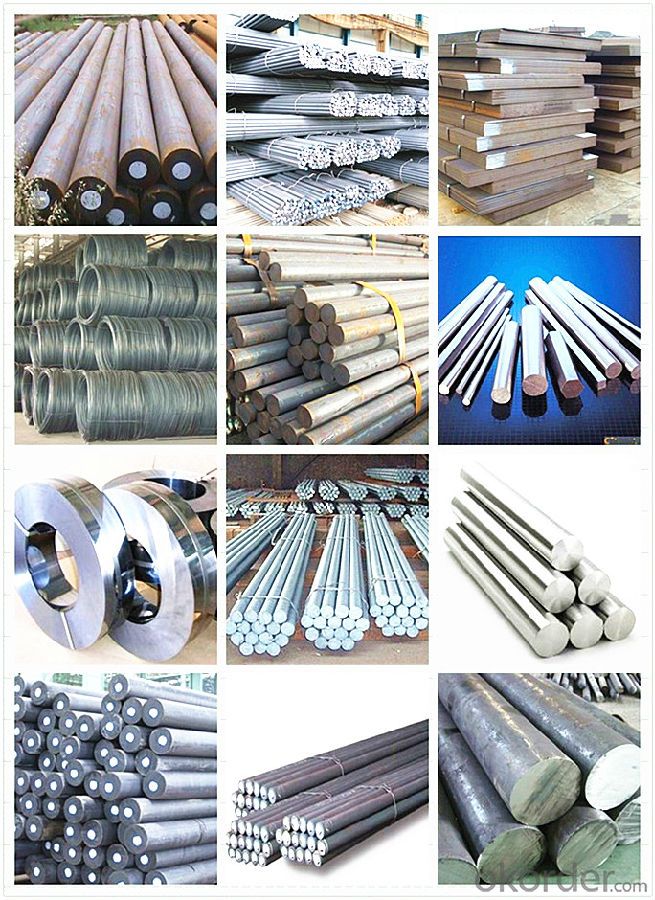
FAQ
Are you a trading company or manufacturer? | Manufacturer |
What’s the MOQ? | 3 metric ton |
What’s your delivery time? | 15-35 days after downpayment received |
Do you Accept OEM service? | Yes |
what’s your delivery terms? | FOB/CFR/CIF |
What's the Payment Terms? | 30% as deposit,70% before shipment by T/T |
Western Union acceptable for small amount. | |
L/C acceptable for large amount. | |
Scrow ,Paybal,Alipay are also ok | |
Why choose us? | Chose happens because of quality, then price, We can give you both. Additionally, we can also offer professional products inquiry, products knowledge train (for agents), smooth goods delivery, excellent customer solution proposals. |
What's your available port of Shipment? | Main Port, China |
What’s your featured services? | Our service formula: good quality+ good price+ good service=customer's trust
|
Where are your Market? | Covering more than 160 countries in the world |
- Q: What are the challenges in machining special steel?
- Machining special steel poses several challenges, including its high hardness and toughness. Special steels are typically designed to have enhanced properties, such as wear resistance or high strength, which makes them more difficult to machine compared to regular steels. The high cutting forces required and the rapid tool wear during machining are major challenges. Additionally, special steels often have low thermal conductivity, leading to increased heat generation during machining, which further exacerbates tool wear. Therefore, specialized cutting tools, cooling techniques, and machining parameters need to be carefully considered to overcome these challenges and achieve optimal results when machining special steel.
- Q: How does special steel perform in radiation shielding applications?
- Special steel is renowned for its outstanding performance in shielding against radiation, widely recognized for its unique properties and composition. It is an ideal choice in safeguarding against harmful radiation due to its exceptional qualities. One significant advantage of special steel is its remarkable density, which allows for the effective absorption and attenuation of radiation. This attribute enables it to serve as a barrier, effectively preventing the penetration of harmful radiation into sensitive areas. By significantly reducing radiation exposure, special steel plays a crucial role in diverse industries, including nuclear power plants, medical facilities, and aerospace applications. Furthermore, special steel possesses excellent mechanical strength and durability, ensuring long-lasting and reliable radiation shielding. It can withstand extreme conditions while maintaining its effectiveness over time. This durability is particularly vital in environments with continuous or ongoing radiation exposure. Moreover, special steel exhibits high resistance to corrosion and degradation, making it indispensable in radiation shielding applications. This resistance ensures the material remains intact and can provide the necessary protection against radiation for an extended period. As a result, frequent maintenance and replacement are minimized, leading to cost savings and improved operational efficiency. Additionally, special steel can be customized to meet specific requirements, allowing for tailored designs and configurations. This flexibility enables the development of radiation shielding solutions optimized for the unique needs of various applications. Whether it involves shielding panels, containers, or enclosures, special steel can be adapted to provide the most efficient and effective radiation protection. In summary, special steel excels in radiation shielding applications due to its high density, mechanical strength, durability, corrosion resistance, and customization capabilities. It offers reliable and long-lasting radiation protection, ensuring the safety of personnel and equipment in industries where radiation exposure is a concern.
- Q: How does special steel perform in high-stress environments?
- Special steel performs exceptionally well in high-stress environments due to its unique properties. Its enhanced strength, durability, and resistance to corrosion make it highly reliable and capable of withstanding extreme conditions. This allows it to maintain its structural integrity and prevent deformation or failure, making it ideal for use in demanding industries like aerospace, oil and gas, and automotive.
- Q: Can special steel be used in the production of springs?
- Yes, special steel can be used in the production of springs. Special steel, such as alloy steel, is often preferred for manufacturing springs due to its high strength, durability, and resistance to deformation. It allows for the production of springs that can withstand heavy loads, maintain their shape over time, and provide reliable performance in various applications.
- Q: How does special steel perform in food processing applications?
- Special steel is widely used in food processing applications due to its unique properties and benefits. One of the key advantages of special steel in this industry is its exceptional corrosion resistance. Food processing involves exposure to various corrosive substances such as acids, alkalis, and salt solutions. Special steel, such as stainless steel, has a high chromium content that forms a protective oxide layer on its surface, preventing corrosion and ensuring the hygiene and safety of the processed food. Furthermore, special steel is highly durable and resistant to wear and tear. Food processing equipment often undergoes rigorous and repetitive operations, such as cutting, grinding, and mixing. Special steel's high strength and toughness allow it to withstand these demanding applications without compromising its performance or integrity. This durability ensures a longer lifespan for the equipment, minimizing downtime and maintenance costs. Special steel also offers excellent heat resistance, making it suitable for high-temperature food processing applications. It can withstand extreme temperatures without losing its mechanical properties, maintaining its structural integrity and preventing any contamination risks. Moreover, special steel is easy to clean and maintain, which is crucial in the food processing industry. Its smooth surface and non-porous nature prevent the accumulation of food particles, bacteria, and other contaminants, ensuring a high level of hygiene. Special steel is also resistant to chemical cleaning agents and can be easily sterilized, making it an ideal material for food processing equipment. In summary, special steel performs exceptionally well in food processing applications due to its corrosion resistance, durability, heat resistance, and ease of maintenance. Its properties contribute to the safety, efficiency, and longevity of food processing equipment, ensuring high-quality and hygienic food production.
- Q: What is the impact of carburizing on the properties of special steel?
- Carburizing, also known as case hardening, is a heat treatment process that involves introducing carbon into the surface layer of special steel. This process has a significant impact on the properties of the steel, enhancing its hardness, wear resistance, and strength. One of the main effects of carburizing is the formation of a hard outer layer, known as the case, which is rich in carbon. The diffusion of carbon atoms into the steel matrix during carburizing increases the carbon content at the surface, resulting in a higher hardness compared to the core. This hardened case provides excellent resistance against wear, abrasion, and surface fatigue, making it well-suited for applications that require high durability, such as gears, camshafts, and bearings. Additionally, carburizing enhances the strength of the steel, as the increased carbon content improves the material's ability to form martensite, a hard, crystalline structure. This martensitic transformation further contributes to the hardness and strength of the carburized steel, making it suitable for applications that require high load-bearing capacity, such as shafts and axles. Furthermore, carburizing can improve the fatigue resistance of special steel. The hardened case formed during carburizing helps to distribute stress more evenly across the surface, reducing the likelihood of crack initiation and propagation. This increased resistance to fatigue failure makes carburized steel suitable for components subjected to cyclic loading, such as gears and springs. However, it is important to note that carburizing can also have some drawbacks. The increased carbon content at the surface can lead to reduced ductility and toughness, making the material more prone to brittle fracture. To mitigate this issue, it is common to use a lower carbon content steel for the core, ensuring a balance between hardness and toughness. In conclusion, carburizing has a significant impact on the properties of special steel. It enhances hardness, wear resistance, and strength, making it suitable for applications that require durability, high load-bearing capacity, and fatigue resistance. However, the process should be carefully controlled to maintain a balance between hardness and toughness, ensuring the material's overall performance and reliability.
- Q: Can special steel be used in the manufacturing industry?
- Yes, special steel can be used in the manufacturing industry. Special steel refers to various high-quality and specialized alloys that possess unique properties, such as high strength, corrosion resistance, heat resistance, and wear resistance. These properties make special steel suitable for a wide range of applications in the manufacturing industry, including the production of machinery, tools, automotive components, aerospace parts, and construction materials.
- Q: How is special steel used in the food processing industry?
- Special steel is used in the food processing industry for various applications such as manufacturing equipment and machinery, utensils, and containers. Its unique properties, including corrosion resistance, durability, and hygiene, make it suitable for ensuring food safety and maintaining high standards in processing and handling.
- Q: What are the different impact-resistant grades of special steel?
- Impact-resistant grades of special steel refer to steel alloys that are specifically designed to withstand high impact and shock loads without fracturing or deforming. These grades of steel are commonly used in applications where resistance to impact and toughness are crucial, such as in construction, mining, automotive, and defense industries. There are several different impact-resistant grades of special steel available, each with its own unique characteristics and properties. Some of the commonly used impact-resistant grades include: 1. AR400: This grade of steel has a nominal hardness of 400 Brinell (HB) and is known for its exceptional resistance to abrasion and impact. It is often used in applications where high wear resistance is required, such as in bucket liners, crushers, and hoppers. 2. AR500: With a nominal hardness of 500 HB, AR500 steel offers even higher resistance to wear and impact compared to AR400. It is commonly used in applications involving heavy machinery, mining equipment, and armored vehicles. 3. AR600: This grade of steel has a nominal hardness of 600 HB, making it one of the toughest and most impact-resistant steels available. It is often used in applications where extreme wear resistance and durability are essential, such as in chutes, conveyors, and ballistic protection. 4. T-1: T-1 steel is a high-strength, low-alloy (HSLA) steel that offers excellent impact resistance and toughness. It is typically used in applications where high strength and toughness are required, such as in structural components, heavy equipment, and offshore drilling rigs. 5. QT or Quenched and Tempered Steels: These steels are specifically heat-treated to enhance their toughness and impact resistance. They are commonly used in applications that require a combination of high strength, toughness, and impact resistance, such as in gears, shafts, and armor plates. It is important to note that the specific impact resistance of a steel grade depends not only on its composition but also on factors such as heat treatment, fabrication techniques, and design considerations. Therefore, it is crucial to consult with steel manufacturers or experts to determine the most suitable impact-resistant grade for a particular application.
- Q: How does the microstructure of special steel affect its performance?
- The performance of special steel greatly depends on its microstructure. To enhance their properties and meet specific application requirements, special steels are alloyed with specific elements. The microstructure refers to how the steel's crystalline grains are arranged and whether any phase transformations are present within the material. One important aspect of the microstructure is the size of the grains. Through controlled cooling or adding alloys, fine-grained structures can be achieved, leading to improved strength, hardness, and toughness. Smaller grain sizes restrict the movement of dislocations within the material, resulting in increased strength and hardness. This is particularly crucial in applications where high strength-to-weight ratios are needed, such as aerospace or automotive components. The presence of different phases in the microstructure is another critical factor. By adding specific alloying elements, the formation of various phases like martensite, bainite, or ferrite can be promoted. These phases possess different mechanical properties, including hardness, toughness, and corrosion resistance. By carefully controlling the microstructure, it becomes possible to customize the steel's performance for specific applications. For instance, martensitic structures offer high hardness and wear resistance, making them ideal for cutting tools, while bainitic structures provide a good balance of strength and toughness, making them suitable for structural components. Moreover, the microstructure also determines how the steel responds to heat treatment processes like quenching and tempering. Heat treatments can modify the microstructure to achieve desired mechanical properties, such as increasing hardness or improving resistance to fatigue. The ability of the microstructure to transform during heat treatment enables precise control over the steel's performance characteristics. In conclusion, the microstructure of special steel has a significant impact on its performance. Grain size, phase distribution, and response to heat treatment are all crucial factors that influence the steel's mechanical properties and suitability for specific applications. By understanding and manipulating the microstructure, engineers can design special steels with enhanced performance, meeting the demanding requirements of various industries.
Send your message to us
Hot Work Die Steel Round Bar Grade H13 with Competitive Price
- Loading Port:
- Shanghai
- Payment Terms:
- TT OR LC
- Min Order Qty:
- 3 m.t.
- Supply Capability:
- 100000 m.t./month
OKorder Service Pledge
OKorder Financial Service
Similar products
Hot products
Hot Searches
Related keywords
